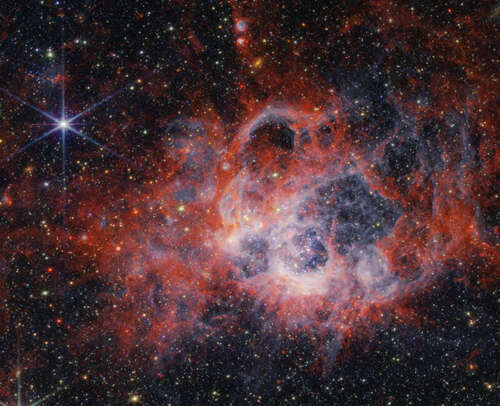
NASA, ESA, CSA, STScI
Good morning. It’s March 12, and today’s photo comes from the James Webb Space Telescope.
Astronomers have long been fascinated by a nebula, NGC 604, in the relatively nearby Triangulum Galaxy. That’s because this nebula contains about 200 of the hottest and largest types of stars, most of which are in the early stages of their lives. Some of these stars are 100 times or more massive than the Sun. Astronomers know of no other region in the Universe so densely packed with large stars as this nebula.
In this image, captured by the Near-Infrared Camera on the Webb telescope, there are brilliant reds and oranges. Here’s the explanation from astronomers for these colors:
The most noticeable features are tendrils and clumps of emission that appear bright red, extending out from areas that look like clearings, or large bubbles in the nebula. Stellar winds from the brightest and hottest young stars have carved out these cavities, while ultraviolet radiation ionizes the surrounding gas. This ionized hydrogen appears as a white and blue ghostly glow. The bright orange streaks in the Webb near-infrared image signify the presence of carbon-based molecules known as polycyclic aromatic hydrocarbons.
The nebula is only about 3.5 million years old.
Source: NASA, ESA, CSA, STScI
Do you want to submit a photo for the Daily Telescope? Reach out and say hello.

